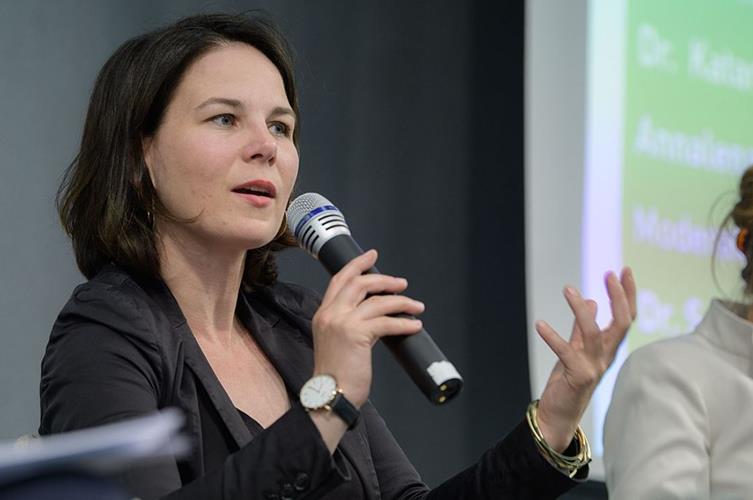Angela Merkel’s unprecedented 16 years in power came to an end on Dec. 8 when Olaf Scholz was sworn in as the new German chancellor, symbolically breaking with tradition by omitting “so help me God” from the oath. Scholz steered his Social Democratic Party (SPD) to the dominant position in last September’s general election by presenting himself as a centrist who would provide continuity, having served as Merkel’s vice-chancellor and finance minister since 2018.
While Scholz successfully marketed himself to voters as a quasi-Merkel, his “traffic light coalition”—red for the SPD, amber for the pro-business Free Democrats (FDP), and green for the Green Party—is an ideologically heterogeneous marriage of convenience. Most problematically, the new Cabinet—composed of seven ministers from the SPD, five from the Greens, and four from the FDP—includes 40-year-old Annalena Baerbock, the Green Party candidate for Chancellor in the last election, as Germany’s new foreign minister.
A far-left ideologue who never held a government office, Baerbock favors a “values-guided” foreign policy. She has repeatedly made aggressively confrontational statements about China, Belarus, and Russia, and is particularly assertive about Hungary, accusing Prime Minister Viktor Orbán’s government of dismantling basic rights. Baerbock has compared herself to Hillary Clintonand favors a globalized world committed to climate neutrality and open borders. Like the rest of her party leadership, Baerbock is committed to a strong Europe—translated as further reduction of national sovereignty—greatly increased government spending on social programs, and a tougher “fight against xenophobia and racism” at home. Her overtly hawkish foreign posture andsupport of interventionism has been described, even by leftist sources, as a combination of “aloof complacency, ignorance and aggressiveness.”
Supporters of diplomatic realism and restraint are dismayed over Baerbock’s new role. She will likely oppose the policies of detente which guide French president Emmanuel Macron’s approach to Moscow. Her rhetoric on Russia has been even sharper than that of U.S. policy makers, and it is certainly at odds with President Joe Biden’s stated policy of stability and predictability vis-à-vis Moscow.
Retired U.S. Army Col. Douglas Macgregor has described Baerbock as “a crusader, the type of person you see in Washington all the time, the type that proclaims, ‘I am changing the world. I’m going to make everything new and different.’ And this would be a big break from the past for the German foreign office.” Nominated by President Trump to be ambassador to Germany, Macgregor sees Baerbock’s liberal internationalism as dangerous. Without trying to understand other nations’ interests, she is committed to reshaping the world “to conform to some sort of ideologically pure and good and morally upright picture that always fails in the end.”
Some veterans of German politics are openly worried. Referring specifically to Baerbock in an interview last week, Scholz’s fellow party member, former German Chancellor Gerhard Schröder (SPD), urged the incoming cabinet to tone down its foreign policy rhetoric. Schröder was referring specifically to Baerbock, who “had already smashed diplomatic china before taking office” with her hardline statements on Russia and China. The 77-year-old ex-Chancellor is known for his advocacy of Germany’s close relations with Russia and sits on the board of the contentious Nord Stream 2 gas pipeline project, which Baerbock opposes.
Warning against any abrupt change in Germany’s foreign policy, Schröder called for a more restrained approach to important partners such as China and Russia. He said that a policy based on the Greens’ slogan, (“The Greens should heal the world,” would definitely not work in relations with other countries. Germany should not give up its values, Schröder added, but neither should it come across as arrogant, lecturing, and seeking to politically isolate others. “A moralizing foreign policy will do nothing,” Schröder concluded.
Schröder’s misgivings were justified by Baerbock on her first day in the new post. She visited Paris and Brussels and “proved to be a reliable spokesman for transatlantic key words… building a massive front against Russia,” the German right-of-center magazine Zuerst! reported. After meeting her French counterpart Jean Yves le Drian, Baerbock said that Moscow would pay a high political and economic price for “a renewed violation (!) of Ukrainian statehood.” In Brussels she advocated a new, ill-defined concept of strategic sovereignty for Europe vis-à-vis Russia and China.
Judging by her maiden foreign tour, Annalena Baerbock will be the most interventionist-minded, Russophobic, and Euro-federalist German foreign minister ever.
—
Part II of this article can be found here.
Correction: Paragraph six originally referred to former German Chancellor Gerhard Schröder as Annalena Baerbock’s fellow party member. The article has been updated to reflect the fact that Schröder is a member of the SPD, not the Green Party.
Flickr-Heinrich-Böll-Stiftung, CC BY-SA 2.0
